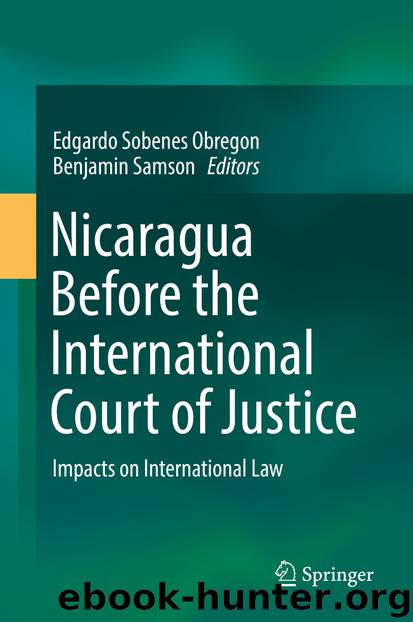Nicaragua Before the International Court of Justice by Edgardo Sobenes Obregon & Benjamin Samson

Author:Edgardo Sobenes Obregon & Benjamin Samson
Language: eng
Format: epub
Publisher: Springer International Publishing, Cham
2.2 The In Dubio Mitius Principle: State Sovereignty and Treaty Interpretation
The Court in the Navigational and Related Rights also took up the in dubio mitius principle (sometimes also referred to as in dubio pro mitiore or pro libertate). This ‘restrictive interpretation’ principle may be used in treaty interpretation in deference to the sovereignty of states. For a long time it was considered, or at least it was argued, that treaty interpretation should be geared towards upholding the sovereignty of the States parties to any given treaty43 in accordance with the general, traditional presumption in favour of sovereignty.44 The principle provides that in cases where the meaning of a term is ambiguous, that interpretation is to be preferred which is less onerous and restrictive with respect to the party assuming an obligation, as it is this interpretation that interferes less with its sovereignty.45 The principle can be traced back to SS ‘Wimbledon’, and PCIJ jurisprudence can be seen as having consistently embraced it in order to resolve ambiguities in the language of a provision.46 However, it was evident already back then that the principle was to be approached with caution and perhaps even some suspicion. The PCIJ characteristically found that it cannotaccept the […] contention that, the text being doubtful, the solution should be adopted which imposes the least restriction on the freedom of States. This argument, though sound in itself, must be employed only with the greatest caution. To rely upon it, it is not sufficient that the purely grammatical analysis of a text should not lead to definite results; there are many other methods of interpretation, in particular, reference is properly had to the principles underlying the matter to which the text refers; it will be only when, in spite of all pertinent considerations, the intention of the Parties still remains doubtful, that that interpretation should be adopted which is most favourable to the freedom of States.47
Download
This site does not store any files on its server. We only index and link to content provided by other sites. Please contact the content providers to delete copyright contents if any and email us, we'll remove relevant links or contents immediately.
The Social Psychology of Inequality by Unknown(3018)
The Plant Paradox by Dr. Steven R. Gundry M.D(2611)
The Writing on the Wall by Anselm Jappe(2040)
Working for Yourself by J.D. (Nolo) Stephen Fishman(1865)
Get What's Yours for Medicare by Philip Moeller(1686)
Every Landlord's Legal Guide by Janet Portman & Stewart Marcia & Ralph Warner(1663)
The First 20 Hours: How to Learn Anything ... Fast by Kaufman Josh(1662)
ADHD on Trial by Michael Gordon(1574)
Decisive by Chip Heath(1561)
Working for Yourself by Stephen Fishman J.D. (Nolo)(1525)
Drafting Contracts: How and Why Lawyers Do What They Do, Second Edition by Stark Tina L(1498)
A Practical Guide to International Arbitration in London by Hilary Heilbron(1434)
The Lord of the Rings: The Fellowship of the Ring, the Two Towers, the Return of the King by J. R. R. Tolkien(1430)
Restitution by Restitution(1424)
The Economist Aug 8th 2015 by The Economist(1423)
Intellectual Property Strategy by John Palfrey(1419)
The Economist Aug 29th 2015 by The Economist(1388)
Collusion by Luke Harding(1315)
Persuasion by Owner(1293)
